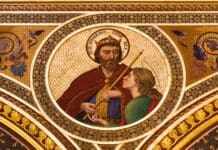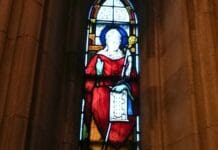St. Oliver Plunkett was born on 1 November 1625 into an influential Anglo-Norman family at Loughcrew, near Oldcastle, Co Meath. In 1647, he went to the Irish College in Rome to study for the priesthood and was ordained a priest in 1654. The arrival of Cromwell in Ireland in 1649 initiated the massacre and persecution of Catholics. Cromwell left in 1650 but his legacy was enacted in anti-Catholic legislation. During the 1650s, Catholics were expelled from Dublin and landowners were dispossessed. Catholic priests were outlawed and those who continued to administer the sacraments were hanged or transported to the West Indies. To avoid persecution, Plunkett petitioned to remain in Rome, and in 1657 became a professor of theology.
When anti-Catholicism eased, Plunkett returned to Ireland. In 1657 he became archbishop of Armagh. He set about reorganising the ravaged Church, and built schools both for the young and for clergy whom he found ‘ignorant in moral theology and controversies’. He tackled drunkenness among the clergy, writing ‘Let us remove this defect from an Irish priest, and he will be a saint.’
In 1670, he summoned an episcopal conference in Dublin, and later held numerous synods in his own archdiocese. However, he had a long standing difference with the archbishop of Dublin, Peter Talbot, over their rival claims to be primate of Ireland. He also antagonised the Franciscans, particularly when he favoured the Dominicans in a property dispute.
With the onset of new persecution in 1673, Plunkett went into hiding, refusing a government edict to register at a seaport and await passage into exile. In 1678, the so-called Popish Plot concocted in England by Titus Oates led to further anti-Catholicism. Archbishop Talbot was arrested, and Plunkett again went into hiding. The privy council in London was told he had plotted a French invasion.
In December 1679, Plunkett was imprisoned in Dublin Castle, where he gave absolution to the dying Talbot. Taken to London, he was found guilty in June 1681 of high treason on perjured evidence from two disaffected Franciscans. On 1 July 1681, Plunkett became the last Catholic martyr in England when he was hanged, drawn and quartered at Tyburn. He was beatified in 1920 and canonised in 1975, the first new Irish saint for almost seven hundred years.
















